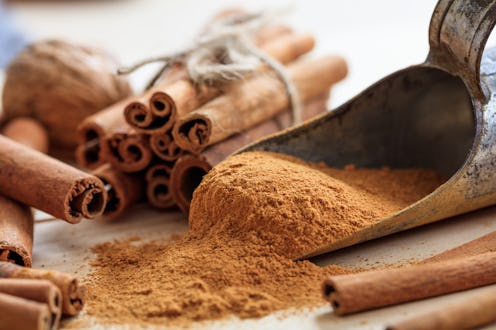Inflammation might not be something that you think about too often in regards to your health, but there are a few reasons it should be. Inflammation is an important part of the body's immune response. It can cause or contribute to so many chronic illnesses, like arthritis, heart disease, Alzheimer's disease, Parkinson's disease, and sometimes even cancer. Keeping inflammation in check is key to staying healthy, and so it's definitely worth paying attention to. That said, there are some foods that reduce inflammation, and others that make it worse. If you struggle with any chronic illnesses, or if you just want to avoid triggering inflammation, these foods are worth considering adding into your diet.
Not convinced? Research has found that eating to reduce inflammation can protect against certain diseases. According to Harvard Health, the foods that make inflammation worse are items that are generally refined carbs (like white bread), fried foods, soda, red meat, processed meat, and margarine. Foods that are high in sugar in general can make inflammation worse and can lead to things like joint pain and fatigue. Of course, these foods are all alright in moderation, but if you're looking to reduce inflammation, it's worth considering.
You might already know about some of the more popular choices that reduce inflammation: spices like turmeric and ginger are well-known for their healing abilities when it comes to inflammation. But there's so many more options out there. Here are a few foods that help reduce inflammation that are worth adding to your diet.
1Sardines
Sardines might not be a number one staple in your diet, but maybe they should be. Fatty, oily fish, like sardines, is great for reducing inflammation in the body. Sardines are high in omega-3 fatty acids, which work hard in reducing inflammation. If you can't stomach the thought of sardines, you can try salmon, mackerel, or tuna. While eating fish is your best bet, if you really dislike it, you can also try taking fish oil supplements.
2Berries
Fruit in general is great for fighting inflammation, thanks to the fact that they are high in fiber and antioxidants. Berries in particular have even stronger benefits because of flavonoids, the antioxidant that makes berries colorful. The antioxidants in blueberries, blackberries, and raspberries have been known to help fight cancer and reduce the risk of cardiovascular disease. If you don't like berries, try eating apples or pineapples, both of which also stand out for their inflammatory powers in the fruit family.
3Garlic
If you already add garlic to absolutely everything, you're in good hands. Studies have found that garlic is a great remedy for swollen joints. Bulb vegetables (including onions) are known for their anti-inflammatory substances and also their sulfur compounds, both of which help the immune system.
4Cinnamon
You already know about the power of ginger and turmeric for anti-inflammatory situations. Cinnamon is another spice that works wonders. According to Shape, it's been known to "help reduce and balance blood sugar, improve working memory, and even make your period less horrible. Its high concentration of anti-inflammatory and antioxidant compounds helps protect the body from oxidative stress, fight infections, and repair tissue damage."
5Olive Oil
Olive oil is a great for reducing inflammation because it's rich in omega-9 fatty acids. If you're not into olive oil, try avocado oil, grapeseed oil, or coconut oil.
6Bone Broth
Bone broth is having a huge moment in the health world right now, and for good reason. It's very good for you, and is loaded with collagen, magnesium, calcium, phosphorous, and glucosamine. Bone broth is great for staying healthy in general, and it's also known for fighting inflammation. It's worth trying out!
7Broccoli
Dark green, leafy veggies are key for fighting inflammation because they contain vitamin E, which is super important. Broccoli is a great way to get vitamin E, but so are spinach, Swiss chard, and kale. These veggies also include calcium, iron, and important flavonoids, so you really can't go wrong when eating them.
8Beets
Beets are really, really good for you, and they're kind of underrated because they're also delicious. The bright red color means that they have great antioxidant properties that can reduce inflammation and also protect against diseases like cancer.
9Chocolate
Good news: there is more to fighting inflammation than eating fruits and veggies. Chocolate is also a way to fight inflammation. According to Reader's Digest, dark chocolate contains chemicals that fight inflammation. Yum!
10Oranges
Oranges are another fruit that are great for fighting inflammation. One British study found that people who ate foods with a chemical found in oranges and other orange colored fruits were less likely to have painful inflammatory joint conditions.
11Sweet Potatoes
According to Eco Watch, sweet potatoes are great for an anti-inflammatory diet because they are high in vitamins C and E. They also contain carotenoids alpha and beta carotene, which both reduce inflammation.. and as a bonus, lead to healthy skin.
12Tomatoes
Nightshade veggies can be tough for people with rheumatoid arthritis, so if you have that, tomatoes won't help. Speak to your doctor before incorporating them into your anti-inflammatory diet, but if they work for you, they'll help. They are rich in lycopene, which can reduce inflammation in the lungs, and tomato sauce does count.
13Tart Cherries
According to a 2012 presentation, cherries contain the "highest anti-inflammatory content of any food. Health.com says that cherry juice powder can "reduce the inflammation in lab rats’ blood vessels by up to 50 percent; in humans, it helps athletes recover faster from intense workouts and decreases post-exertion muscle pain." That's pretty impressive!
14Moringa
You may not have heard of moringa, but it's great for anti-inflammatory purposes. It's a superfood spice from West Africa, India, and South America, and it's loaded with antioxidants, protein, iron, and vitamin C. It's super healthy and can be ingested as tea.
